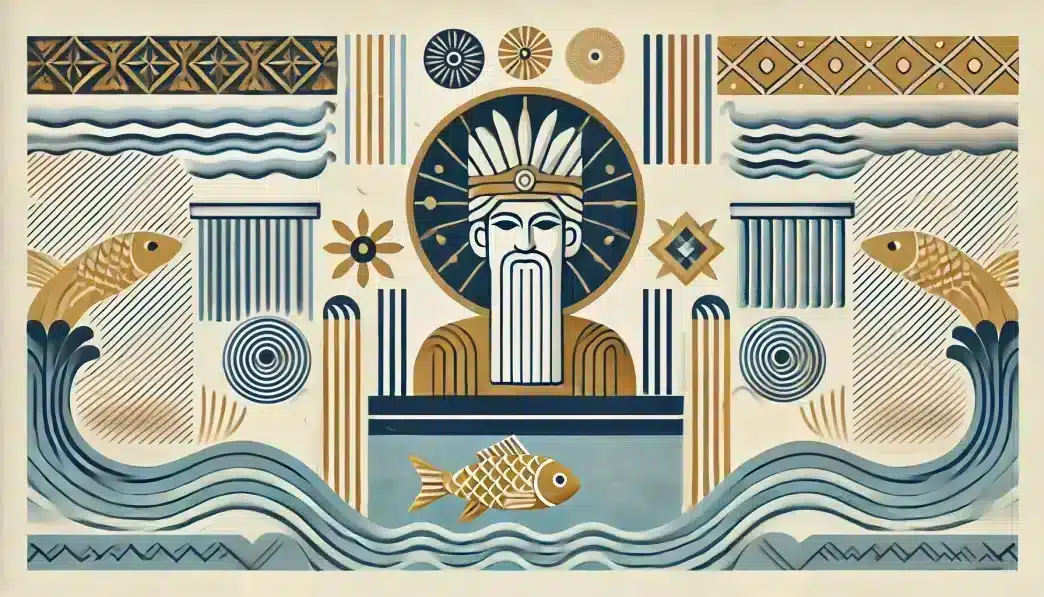Enki, also known as Ea in Akkadian mythology, is one of the most important deities in Mesopotamian religion. Revered as the god of water, wisdom, creation, and magic, Enki played a vital role in shaping the cosmos and protecting humanity. His association with the freshwater abyss, known as the Apsu, symbolizes life, fertility, and renewal.
Name: Enki (Akkadian: Ea)
Role: God of water, wisdom, creation, and magic
Mythology: Mesopotamian (Sumerian, Akkadian, Babylonian, Assyrian)
Domain: Freshwater (Abzu), wisdom, crafts, fertility, and incantations
Consort: Ninhursag (also known as Ninmah, Mama, or Damkina)
Parents: Anu (sky god) and Nammu (primordial sea goddess)
Symbols: Goat-fish (Capricorn), flowing water, and the horned crown
Origin and Background
Enki was one of the most significant gods in the Mesopotamian pantheon. While referred to as Ea by the Babylonians, his Sumerian name, Enki, is more widely recognized. Enki was the god of the abyss or deep waters (abzu), the foremost deity of freshwaters, and the god of wisdom in Sumerian mythology.
He is often depicted wearing the skin of a fish, emphasizing his role as a water deity. Among the Hittites, Ea was also regarded as the god of wisdom. His consort is Ninhursag, and he is considered the father of Marduk (Bel, Baal). Some traditions also suggest that Inanna and Dumuzi (Tammuz, Attis, Adonis) may be his children.
Possible connections have been drawn between Enki-Ea and other deities, such as Ya (linked to Ebla and the Shasu), Oannes, and Dagon, indicating his influence across various ancient cultures.
Mythological Significance
Creation of Humanity
In the Atrahasis Epic, Enki creates humans from clay to relieve the gods of their labor. When the god Enlil decides to destroy humanity with a flood, Enki warns Atrahasis and provides guidance for building an ark, ensuring the survival of humanity and other life forms.
Keeper of the Me
Enki is the custodian of the Me, divine decrees that form the foundation of civilization, including laws, rituals, and societal roles. In the myth Inanna and Enki, the goddess Inanna acquires the Me from him, spreading them to her city, Uruk, to bring civilization to her people.
Enuma Elish
In the Babylonian creation epic Enuma Elish, Enki (as Ea) defeats the primordial god Apsu, who sought to destroy the younger gods. Using his wisdom, Enki casts a spell to put Apsu to sleep and then slays him, establishing his dwelling upon the deep waters.
Symbols and Iconography
Enki is depicted with streams of water flowing from his shoulders, sometimes accompanied by fish, representing his dominion over freshwaters and life.
- Goat-Fish: A mythical creature symbolizing his connection to both land and water, later associated with the astrological sign Capricorn.
- Flowing Water: Representing fertility and abundance.
- Fish Skin: Highlighting his role as a water deity.
- Horned Crown: Denoting his divine authority.
Personality and Traits
Enki is known for his wisdom, compassion, and ingenuity. Unlike other deities who might show wrath or vengeance, Enki often acts as a mediator and benefactor to gods and mortals alike. His cleverness and protective nature make him a beloved figure in Mesopotamian mythology.
Famous Myths
The Flood Myth
Enki plays a central role in the Mesopotamian flood myth, warning Atrahasis about the impending deluge and instructing him to build a boat. His actions highlight his role as a protector of humanity and life.
Inanna and Enki
In this myth, Enki generously offers Inanna the Me during a feast. She cleverly brings them to her city, spreading the foundations of civilization.
The Creation of the World
Enki is credited with creating and shaping the world using his mastery over water. His role as a cosmic architect reflects his importance in maintaining order and life.
Worship and Legacy
Enki’s primary cult center was in Eridu, one of the earliest cities in Mesopotamia. His temple, E-Abzu (House of the Abzu), was a hub for religious and scholarly activities. Worshippers sought his blessings for wisdom, fertility, and protection.
Enki’s influence extended beyond Mesopotamia, impacting neighboring cultures. His attributes were integrated into other mythologies, such as those of the Canaanite god Dagon and the Babylonian god Marduk, showcasing his far-reaching legacy.
Conclusion
Enki, the god of wisdom, water, and creation, stands as a cornerstone of Mesopotamian mythology. His compassion, ingenuity, and protective nature ensured the survival and prosperity of humanity. As a mediator and architect of life, Enki’s enduring legacy reflects his pivotal role in ancient Mesopotamian culture and beyond.
